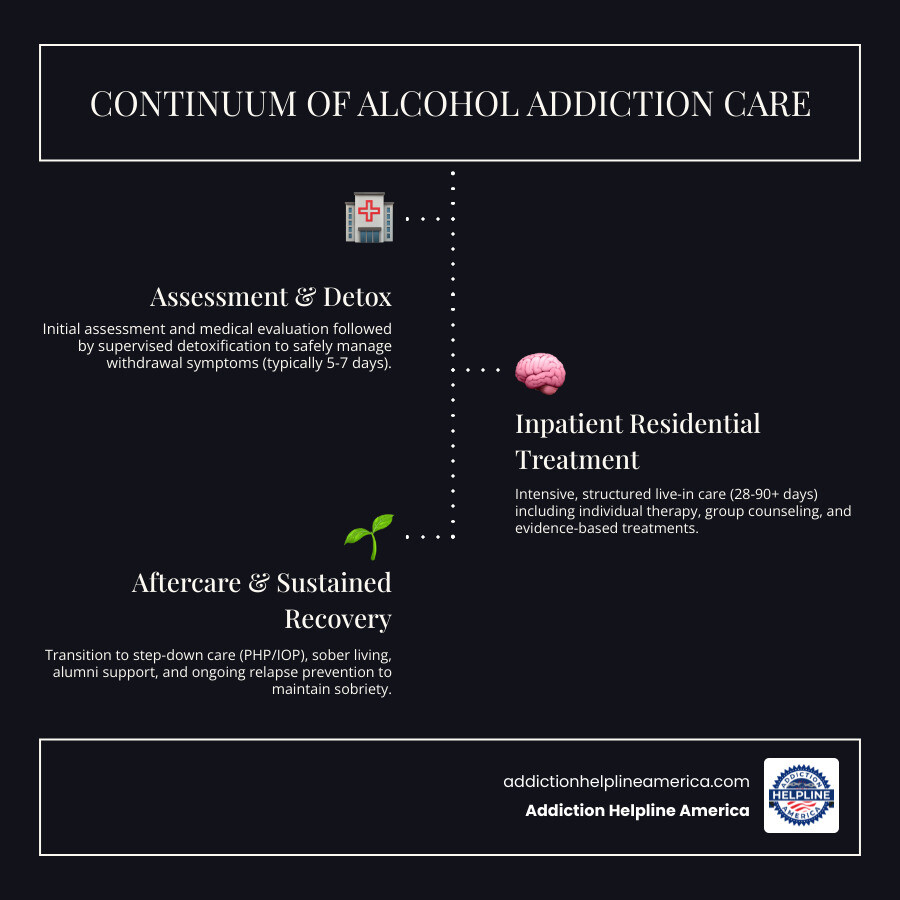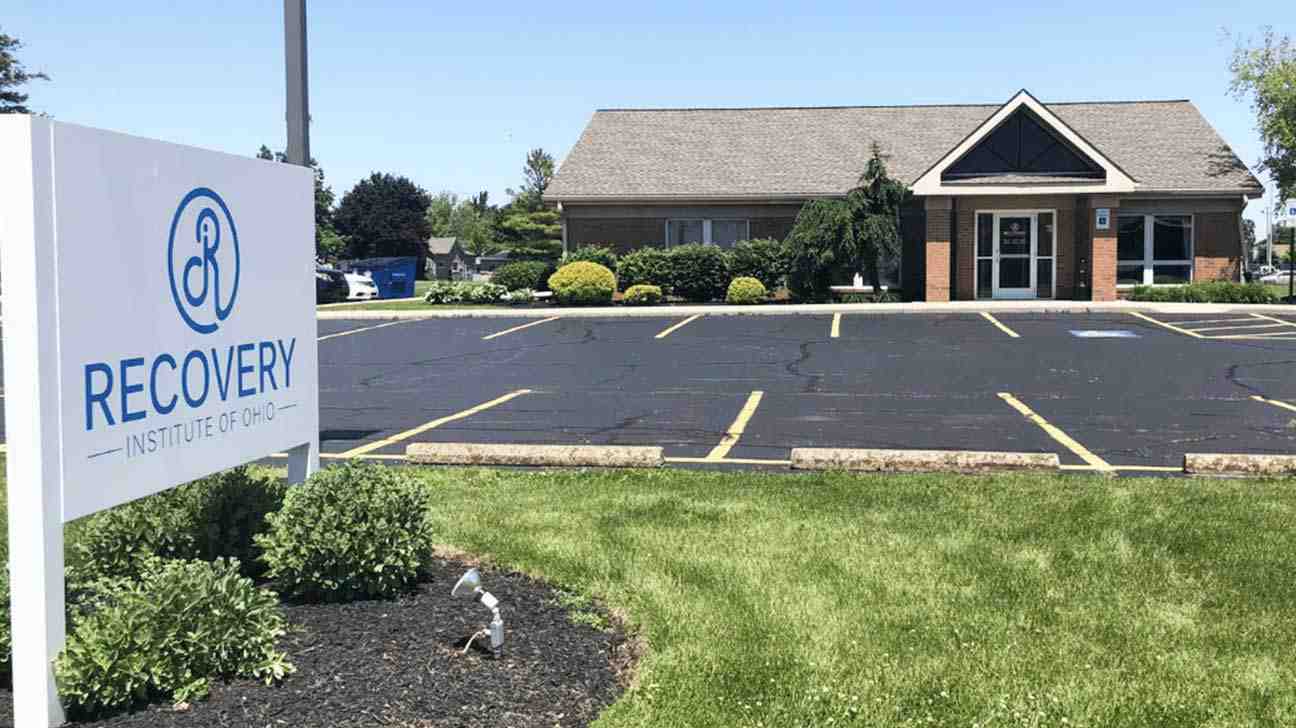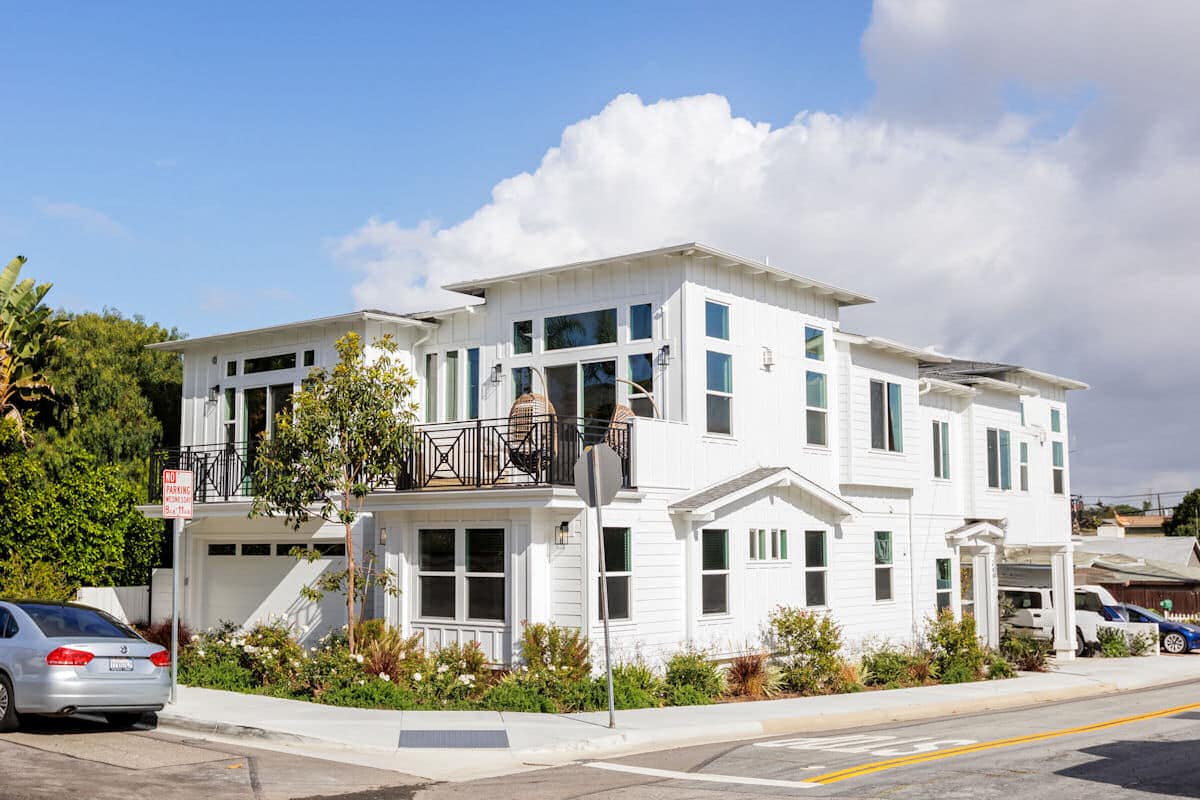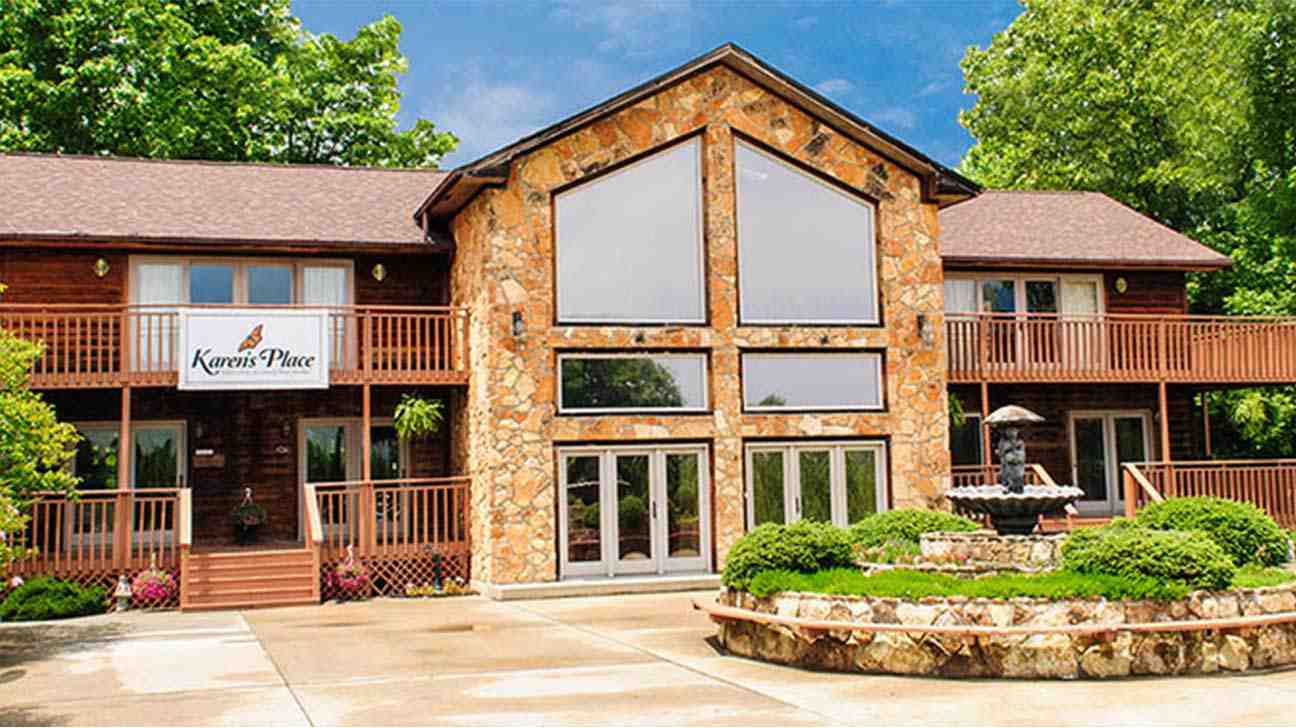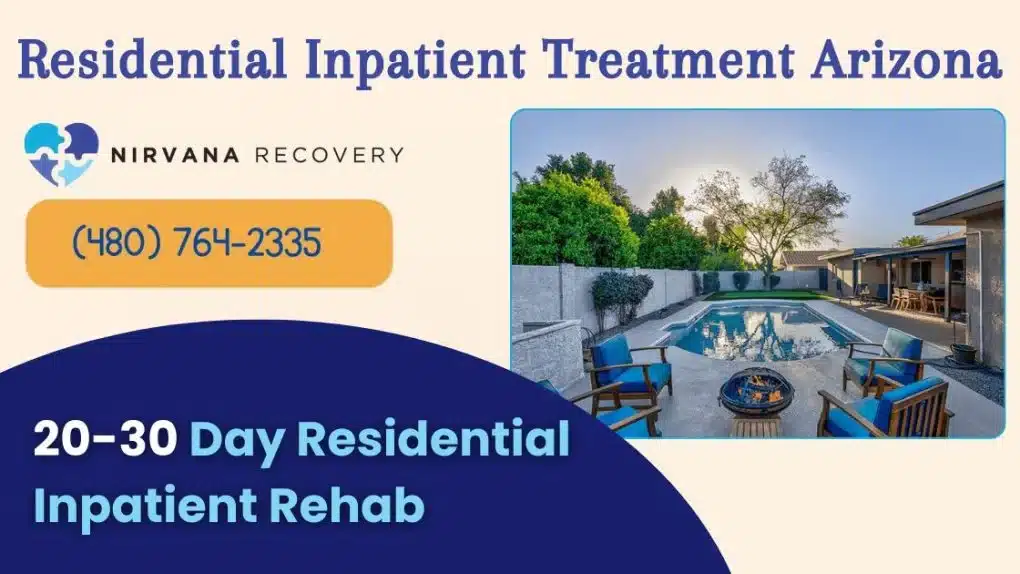
Understanding Your Path to Recovery
Accepting the need for help is the first and most courageous step toward recovery. If you or a loved one is struggling with Alcohol Use Disorder (AUD), you’re not alone. Inpatient residential programs offer a structured, proven path to healing by providing a complete break from the chaos of addiction.
An alcohol rehab inpatient residential program is a live-in treatment option where you stay at a facility 24/7 to receive intensive care. It’s designed for those who need a safe environment away from triggers and negative influences.
Key Features:
- 24/7 medical supervision and emotional support
- Structured daily schedule with therapy and counseling
- Evidence-based therapies like CBT and group counseling
- Typical duration of 28-90 days, with longer programs available
- Aftercare planning to support your transition back to daily life
This guide covers what to expect during treatment, the therapies involved, and how to choose the right program. At Addiction Helpline America, we provide free, confidential guidance 24/7 to connect you with quality alcohol rehab inpatient residential programs nationwide. Our specialists are here to help you find the right fit for your unique needs.
Alcohol rehab inpatient residential program terms explained:
Understanding the Core Components of an Alcohol Rehab Inpatient Residential Program
When you enter an alcohol rehab inpatient residential program, you’re stepping into a space designed for healing. These programs create a protective bubble where you can focus entirely on recovery, away from the chaos of addiction.
You’ll have access to 24/7 medical and emotional support, a structured environment that provides stability, and a peer support community of people who understand your struggles. It’s immersive care where recovery becomes your life for a time, not something squeezed into the margins.
What is an Alcohol Rehab Inpatient Program?
An alcohol rehab inpatient residential program is a treatment option where you live at the facility, typically for 28 days to several months. It provides intensive, structured care focused on overcoming alcohol addiction, with constant medical supervision in a safe and supportive setting. Think of it as hitting pause on your regular life to give your recovery the full attention it deserves.
Key Differences: Inpatient vs. Outpatient Rehab
Understanding the distinction between inpatient and outpatient treatment helps you make the right choice. While both are valuable, they serve different needs.
| Factor | Inpatient Rehab | Outpatient Rehab |
|---|---|---|
| Living Arrangements | Reside at the facility 24/7 | Live at home, commute to treatment |
| Time Commitment | Full-time, immersive | Part-time, flexible scheduling |
| Level of Supervision | Constant, 24/7 medical and clinical oversight | Scheduled appointments, less direct supervision |
| Ideal Candidate | Severe AUD, co-occurring disorders, unstable home, need for detox, history of relapse | Mild to moderate AUD, stable home, strong support system, work/school commitments |
| Cost | Generally higher due to accommodation and round-the-clock care | Generally lower, as no accommodation costs are involved |
Inpatient care is ideal for those with severe AUD, co-occurring mental health conditions, or an unstable home environment. Outpatient treatment works well for people with milder addiction and a strong support system. For a more detailed comparison, check out our guide on Drug Rehab: Inpatient vs Outpatient.
Benefits of an Alcohol Rehab Inpatient Residential Program
Choosing an inpatient program is a big leap, but the benefits can be life-saving. It offers a hard reset for recovery by removing you from triggers. You get access to 24/7 medical care, which is crucial during detox. The intensive therapy schedule helps you make progress quickly through daily individual and group counseling. You’ll also be building a sober support network with peers who understand your journey. Most importantly, you can focus solely on healing without the distractions of work, family drama, or daily stress. That singular focus can make all the difference.
What to Expect During Inpatient Treatment
Entering an alcohol rehab inpatient residential program means joining a therapeutic community where every day is structured to support your healing. Your journey will be guided by an individualized treatment plan custom to your specific challenges and goals.
The Admissions and Intake Process
The process begins with a confidential consultation to discuss your situation. An admissions specialist will gather information about your alcohol use and verify your insurance benefits to clarify costs. Next, you’ll undergo a comprehensive medical and psychological evaluation to assess the severity of your AUD and screen for any co-occurring conditions. This information is used to create your personalized treatment plan. Our Rehab Admissions Hotline team can walk you through every step.
Medical Detoxification: The First Step
For most, treatment begins with medical detoxification. Suddenly stopping alcohol after prolonged use can cause dangerous withdrawal symptoms, including tremors, seizures, or delirium tremens. Attempting to quit “cold turkey” alone is unsafe.
During medically monitored detox, you receive 24/7 care from professionals who can administer medications to ease discomfort and prevent complications. The goal is to keep you safe and comfortable as your body stabilizes. Alcohol detox typically lasts five to seven days. This process is also critical for withdrawal from substances like Benzodiazepine.
Therapies and Services Offered
Recovery programs use evidence-based therapies that are scientifically proven to work.
- Cognitive Behavioral Therapy (CBT) helps you identify and change negative thought patterns that lead to drinking.
- Dialectical Behavioral Therapy (DBT) focuses on emotional regulation, mindfulness, and distress tolerance skills.
- Group therapy provides a powerful sense of community, allowing you to share your story and learn from peers.
- Individual counseling offers one-on-one time with a therapist to explore the root causes of your addiction.
Many programs also offer experiential therapies (art, music, equine) and 12-Step facilitation to connect you with a broader recovery community. The Arkansas Department of Human Services offers more information on substance abuse treatment resources.
Program Duration: How Long Does It Last?
The length of your stay depends on your individual needs and progress. Most alcohol rehab inpatient residential programs offer 28 to 30-day, 60-day, or 90-day options. While a 30-day program provides a solid foundation, research shows that longer stays of 90 days or more lead to significantly better long-term outcomes. This extra time allows for deeper healing and more practice with new coping skills. Your treatment team will work with you to determine the appropriate duration based on clinical milestones.
The Role of Medication-Assisted Treatment (MAT)
Medication-Assisted Treatment (MAT) is a valuable tool that combines FDA-approved medications with counseling to treat AUD. These medications are not a cure but provide support while you develop recovery skills.
Common medications like Naltrexone, Acamprosate, and Disulfiram work by reducing cravings, restoring brain chemistry, or creating a negative reaction to alcohol. MAT is most effective when integrated into a comprehensive treatment plan, as it can improve retention and support long-term sobriety. Understanding the Role of Medication is an important part of the recovery conversation.
The Role of Integrated and Family Care in Recovery
Effective alcohol rehab inpatient residential programs recognize that addiction affects the entire family and is often linked to underlying mental health issues. True healing involves addressing these root causes and involving loved ones in the recovery process.
Treating Co-Occurring Mental Health Conditions
Nearly 80% of people seeking treatment for alcohol addiction also struggle with a mental health condition like depression, anxiety, or PTSD. This is known as a dual diagnosis. Treating the addiction without addressing the mental health issue (or vice versa) is often ineffective. For example, untreated depression can easily trigger a relapse. The link between Bipolar and Addiction also requires specialized care.
Quality programs provide integrated treatment, where a team of specialists addresses both conditions simultaneously. If you’re concerned about mental health, our Mental Health Hotline can connect you with facilities equipped for dual diagnosis.
The Importance of Family Involvement
Addiction is often called a family disease because its impact extends to partners, children, and parents. Involving family in the recovery process is crucial for healing the entire system.
Many programs offer family therapy sessions in a safe, guided environment to improve communication and begin rebuilding trust. Educational workshops help families understand the science of addiction, which fosters compassion over frustration. You’ll learn to set healthy boundaries and avoid enabling behaviors.
Support for families continues outside of treatment through groups like New Jersey – Al-Anon Family Group and Families Anonymous. When families heal together, the person in recovery gains a stronger support system, and relationships have a chance to mend.
Navigating Life After Inpatient Rehab
Completing an alcohol rehab inpatient residential program is a huge achievement, but it’s the beginning of your recovery journey, not the end. Transitioning back to daily life means putting the tools you’ve learned into practice and building a sober lifestyle.
This involves creating new routines, finding healthy ways to cope with stress, and using relapse prevention strategies to steer triggers. The skills you learned in treatment are for life.
Continuing Care and Aftercare Plans
Recovery doesn’t stop at discharge. A quality program creates a detailed aftercare plan with you before you leave. This plan often includes step-down care to gradually transition back to daily life.
- Partial Hospitalization Programs (PHP) involve several hours of treatment per day while you live at home.
- Intensive Outpatient Programs (IOP) offer treatment several evenings a week, allowing for work or school commitments. You can learn more from our Intensive Outpatient Costa Mesa Guide.
- Sober living homes provide a structured, substance-free environment with peer support as you transition to independent living.
Many facilities also have alumni programs and encourage ongoing therapy and participation in support groups like Alcoholics Anonymous to maintain a strong recovery network.
Success Rates and Long-Term Outcomes
Success in recovery is more than just abstinence. It’s measured by improved quality of life, better physical and mental health, and restored relationships. While there are no guarantees, certain factors significantly improve long-term outcomes.
Your personal commitment and active engagement in treatment are key. However, studies consistently show that long-term engagement in aftercare is the most critical factor. People who stay connected to therapy, support groups like Northern New Jersey Alcoholics Anonymous, or alumni programs have significantly better outcomes.
It’s also important to remember that relapse can be part of the recovery process. It does not mean you have failed. Addiction is a chronic condition, and setbacks can happen. What matters is reaching out for help immediately, reconnecting with your support system, and getting back on track.
Practical Considerations: Cost, Payment, and Choosing a Facility
Deciding to seek help is the first step. Next come the practical questions: How much does it cost, how can I pay for it, and how do I find the right facility? Making an informed decision about an alcohol rehab inpatient residential program requires understanding these details.
How is the Cost of Inpatient Rehab Determined?
The cost of an alcohol rehab inpatient residential program varies based on several factors:
- Location: Facilities in major metropolitan or scenic areas may cost more.
- Amenities: Programs with private rooms, gourmet meals, or spa services, like those in Luxury Rehab Programs, have higher price points.
- Length of Stay: A 90-day program will cost more than a 30-day program.
- Services Offered: Specialized care for dual diagnosis or a high staff-to-patient ratio can increase the cost.
Our guide, How Much Does Rehab Cost?, provides a more detailed breakdown.
Payment Options: Insurance and Financial Aid
Cost should not be a barrier to recovery. Most health insurance plans are required to cover substance abuse treatment. We can help you verify your benefits to understand your coverage, including deductibles and co-pays. Many facilities also offer sliding scale fees based on income, and state-funded programs provide care at little to no cost for those who qualify. To learn more about low-cost options, read our article: Is There Free Alcohol Addiction Treatment Centers?.
Finding the Right Alcohol Rehab Inpatient Residential Program
Choosing the right program is crucial. Here’s what to look for:
- Licensing and Accreditation: Ensure the facility is licensed by the state and accredited by a reputable body like The Joint Commission. This signals high standards for safety and care.
- Staff Credentials: The team should include licensed therapists, certified addiction counselors, and medical professionals.
- Individualized Approach: Avoid cookie-cutter programs. A quality facility will create a treatment plan custom to your unique history and goals.
- Specialized Care: If you have a dual diagnosis or other specific needs (e.g., trauma-informed care), find a program that specializes in those areas.
- Aftercare Planning: A good program begins planning for your life after treatment from day one.
We know this can be overwhelming. Addiction Helpline America exists to help you steer these choices and find a program that aligns with your needs.
Frequently Asked Questions about Alcohol Rehab Inpatient Programs
It’s natural to have questions when considering treatment. Here are answers to some of the most common ones we hear.
How do I know if I need inpatient treatment for alcohol addiction?
If you’re asking this question, you’re already on the right path. Inpatient treatment is often necessary when alcohol use has become unmanageable. Key signs include:
- Being unable to cut down on drinking despite wanting to.
- Experiencing strong cravings or withdrawal symptoms (shaking, sweating, anxiety) when you stop.
- Having tried to quit before without success.
- Living in an unstable or unsupportive home environment.
- Struggling with co-occurring mental health issues like depression or anxiety.
If your relationships, job, or health have been negatively impacted by alcohol, an alcohol rehab inpatient residential program provides the intensive support needed to rebuild. If you’re unsure, call us for a free, confidential assessment of your situation.
What is a typical day like in residential rehab?
The structure of an alcohol rehab inpatient residential program is designed to be purposeful and healing. While schedules vary, a typical day often looks like this:
- Morning: Breakfast followed by group therapy sessions and educational workshops about addiction and recovery.
- Afternoon: Individual counseling, specialized therapies (like art or music), and time for physical activity such as yoga or gym sessions.
- Evening: Dinner, followed by a 12-Step or other support group meeting, and then quiet time for reflection or journaling before bed.
This routine provides stability and fills your time with healing activities, removing the chaos that addiction often creates.
What happens if I relapse after treatment?
Relapse can be a part of the recovery journey; it is not a sign of failure. Addiction is a chronic condition, and setbacks can happen. The most important thing is what you do next.
Do not let shame keep you silent. Reach out immediately to your therapist, sponsor, or a trusted member of your support network. Re-engage with your aftercare plan, whether that means attending more meetings or stepping back into a higher level of care like an outpatient program. Use the experience to understand your triggers better and strengthen your recovery plan. Many facilities offer support for alumni who relapse. What matters is your commitment to getting back on the path to recovery.
Take the Next Step Toward Recovery
You’ve made it to the end of this guide, and that alone says something powerful about where you are in your journey. An alcohol rehab inpatient residential program provides the most intensive level of care available, wrapping you in a supportive, structured environment where healing can truly take root.
Recovery is a journey, not a destination. There will be ups and downs, victories and challenges, but you don’t have to walk this path alone. If you or someone you love is struggling with Alcohol Use Disorder, know that help is available right now, and taking that crucial first step is the most important thing you can do today.
At Addiction Helpline America, we’ve dedicated ourselves to being that bridge between struggle and healing. We provide free, confidential guidance 24/7 to help you find an alcohol rehab inpatient residential program that truly fits your unique needs—your circumstances, your insurance situation, your personal preferences, and your recovery goals. We connect individuals nationwide to a vast network of quality treatment centers, and our team of addiction specialists genuinely cares about your success.
Don’t let another day pass living under the weight of addiction. The life you’ve been hoping for—one filled with purpose, connection, health, and peace—is possible, and it starts with reaching out. Take a moment to Explore different types of treatment programs and find which path might be right for you. When you’re ready to talk, we’re here, ready to listen and help you take control of your future.
Your recovery story is waiting to be written. Let us help you turn the page.
Our helpline is 100%
free & confidential
If you or someone you care about is struggling with drug or alcohol addiction, we can help you explore your recovery options. Don’t face this challenge alone—seek support from us.
Programs
Resources
Will my insurance
cover addiction
treatment?
We're ready to help
Find the best
drug or alcohol treatment
center
Are you or a loved one struggling with addiction? Call today to speak to a treatment expert.

